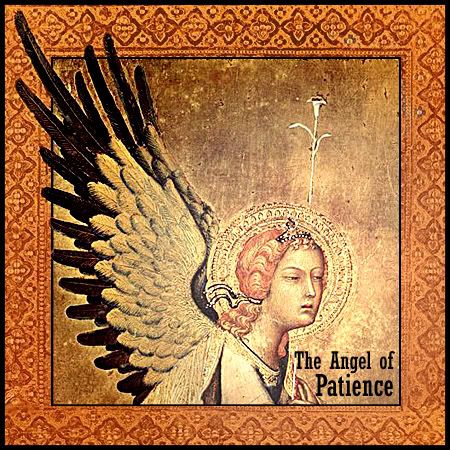
SIMONE MARTINI: The Angel of the Annunciation, 1333;
Tempera on wood, 23,5 x 14,5 cm, Koninklijk Museum voor Schone Kunsten, Antwerp.
The Angel of Patience
by Anselm Grün
To wait patiently is not “en vogue†today. The poet Ulla Hahn writes, “Blessed are the waiting, / They are quickly overtaken, / By the rushing globe. / The hottest piece of world / does not distract their gaze / from the promised way.†There is something to this beatitude, of how paradise belongs to the patient ones, that makes the Angel of Patience visible.
The German word for patience is “Geduld†and derives from Old High German dulten – to bear, to endure and is connected with the Latin word tolerare, tolerate. In the new testament of the Bible the Greek word for patience hypomone actually means “to stay beneathâ€, to persevere, to endure. Sometimes the meaning was interpreted in a passive way, as if we simply have to accept everything. In the early Church patience had much more the meaning of perseverance and pertinacity in the tribulations that besieged the Christians from outside. In Romans 5, 3f Paul said: “And not only so, but we glory in tribulations also; knowing that tribulation worketh patience; and patience, experience; and experience, hope:†And in Colossians it is asked: “that ye might be (…) strengthened with all might, according to his glorious power, unto all patience and long-suffering with joyfulness;†Hypomone means in this case the “steadfast endurance, as it is shown in battle, if you hold the position you have against all attacks of the enemyâ€. This actually still has some meaning for our lives today. Because it means steadfastness against all attacks from outside. Patience is in this case not passive suffering, but active endurance and perseverance. It proves itself to be “persistent power of resistanceâ€. Paul associates longanimity with it, too, makrothymia. The Greek word means someone who has great courage, an open mind, a wide heart, someone who can wait. The old German word “Geduld†has acquired both aspects of meaning during the course of history: steadfastness, endurance, but also the ability to wait, longanimity, the ability to wait and watch until a solution can be found.
The Angel of Patience may teach you the ability to wait. This is by no means a natural ability to have nowadays. We tend to want the solution at once. But often it needs a long time for a blossom to flower. We need patience for our own development. We can’t change ourselves instantly. Change happens slowly and sometimes imperceptible. The images used in the Bible are still relevant today: that is what Jesus spoke of in the parable about the seed that grows on its own (Mk 4, 26-29). James, too, uses the farmer as an example in his exhortation for patience: “Be patient therefore, brethren, unto the coming of the Lord. Behold, the husbandman waiteth for the precious fruit of the earth, and hath long patience for it, until he receive the early and latter rain.†Many people want to see evidence of success at once, when they have started a project. They want to control the progress of their therapies, and they want to see the results of spiritual guidance at once. Obsessed with measuring rates of success, they overlook what is slow to grow inside them. They would need the Angel of Patience very much so that they take time for processes inside them. True growth needs time. Everything that springs up quickly also withers quickly again.
To have patience does not mean to ignore everything that can be changed and should be changed. But you may have patience with yourself and with a situation that cannot be changed and that demands rather an attitude of cheerful serenity. The Angel of Patience wants to support us, too, if we have to suffer through something, if there is a hurtful situation that needs to be endured. Conflicts in marriage, problems in the job cannot always be solved, or at least not quickly. In those cases it is also necessary to endure the painful situation you cannot change quickly, in which you can only hope for a solution, with patience. But patience does not mean that you always have to come to terms with conflicts or that you always have to go for bad compromises. In patience lies the power to work towards changes and transformation. However, time is very important with patience. We have to give ourselves and others time so that something may change.
Patience is also necessary in sickness. This, too, cannot be dealt with at once. The ability to endure is becoming less and less common these days. To endure patiently, to stay beneath, to persevere – there is little demand for these virtues today. And yet we would need them so much to master our lives and to deal with the problems of our world, filled with hope. Therefore I wish that the Angel of Patience may be with you, so that you won’t give up if you are in difficult situations, if there seems to be no solution for a problem at all. The Angel of Patience may give you strength to endure, so that faith and transformation may occur in your life.
© by Anselm Grün, 50 Engel für das Jahr, 1997;
translation by JunoMagic.
Song for December 17:

“Stern und Weg” (“Star and Way”)
by Hans-Jürgen Hufeisen,
album “Gold, Weihrauch und Flöte” (“Gold, Incense and Flute”)

I really like these Advent things. I went to church last Sunday, and they did one there, and although I usually find “churchish” rituals boring and heartless, this was very enchanting and beautiful, and really set a great mood.
As you said, all too often holidays are celebrated in a very heartless way nowadays. And it’s not even religion that’s at stake here, but much more.
What’s so special about holidays in a rich country? In a life where you basically have feast meals every day?
*Nothing.*
We are forgetting what’s special about holidays, no matter if it’s birthdays or Christmas or whatever.
If we really mean to have a holiday as in a “holy day”, a day that is really special, we have to make it special. And for that I think the heart is most important, not if you go to church or if you have a great family dinner.